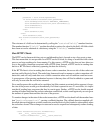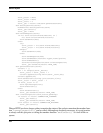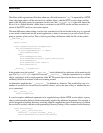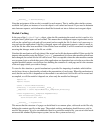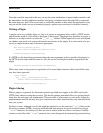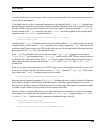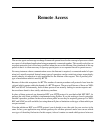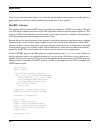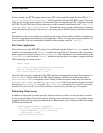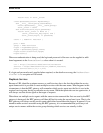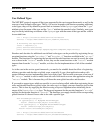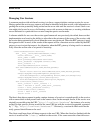
Plugin Aliasing
109
a servlet. In this later case, the name of the resource can remain the same, and no references to the re-
source need to be changed.
To facilitate use of an alias, an optional argument can be supplied to the "plugin()" member func-
tion defining the alternate extension the resource should be identified with. If you wanted all servlet
files accessible using a particular instance of a file server object to be accessed using a ".html"ex-
tension instead of the ".py" extension, the string ".html" would be supplied as the optional third
argument to the "plugin()" member function.
filesrvr.plugin(".py",netsvc.PythonPlugin(),".html")
filesrvr.hide(".py")
Note that if the "hide()" member function isn’t also called with the ".py" extension, the servlet file
would still be accessible with a ".html" extension, but a request against the ".py" extension would
yield the actual Python source code. This would not be an issue if the plugin had at the same time also
been registered for ".py" files, but without the alias.
If the ".py" file is hidden, if the servlet file was called "login.py", it would be accessable as
"login.html", but an attempt to use "login.py" would result in a HTTP error response indicat-
ing that the file could not be found. If the ".py" file isn’t hidden, but the plugin is registered twice,
once without an alias and once with the alias ".html", both "login.py" and "login.html"
would work.
If the servlet files are providing the roles of CGI scripts, it may be desirable for the files to use no ex-
tension at all. That is, the file should be accessed as "login" instead of "login.py". If this is the
case, rather than ".html", an empty string can be provided.
filesrvr.plugin(".py",netsvc.PythonPlugin(),"")
Be aware that the optional argument to "plugin()" defining the alias is actually treated as a filename
suffix and not strictly as an extension. What this means is that that argument need not start with ".",
but can be any arbitrary string in which the name of a resource ends. This means it is actually possible
to synthesis new resources as long as they derive from an actual file.
One use of this is a plugin which returns a servlet which generates a thumbnail version of an image.
For example, if an image file was originally called "holiday.gif", a request against "holiday-
thumbnail.gif" could me made to generate a thumbnail image on the fly.
def factory(session,file):
return ThumbnailServlet(session,file)
filesrvr.plugin(".gif",factory,"-thumbnail.gif")



